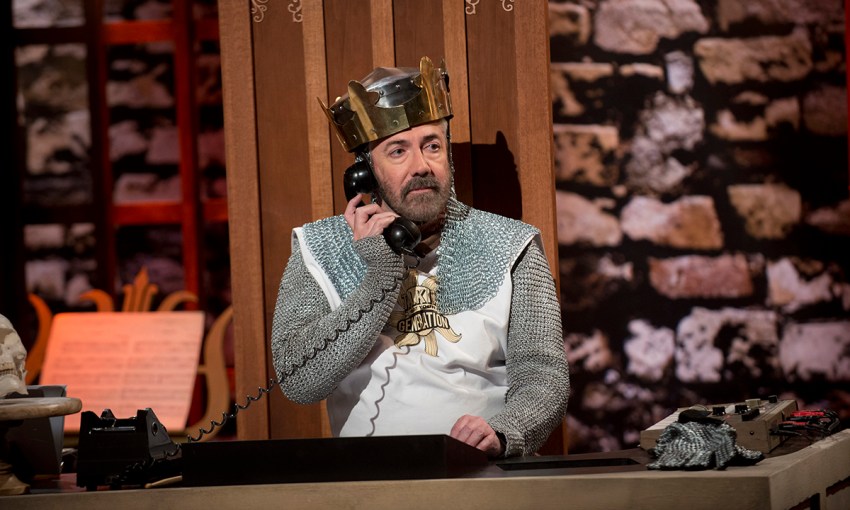Comedian and TV funny man Shaun Micallef reflects on his path to success and ponders how to avoid turning into a sad, old clown in the future.
Shaun Micallef: Seriously funny
It’s easy to see where comedian Shaun Micallef gets his funny streak. Discussing his love of comedy, the 57-year-old writer and performer tells a story about his great-grandmother’s funeral and his mum Judy.
“I think comedy becomes part of your matrix and it’s never more present than in certain situations like when my great-grandmother died,” he says. “We were in the hearse driving all the way to Lochiel Cemetery or Wallaroo or somewhere near Port Wakefield, so it was a cortege that lasted a long time. We were about an hour into it and we were passing these empty, dry fields.
“So, I’m in the hearse with my mother and her father, whose mum has died and her coffin is in the back, and mum says, ‘why don’t we just dump it over there’. My grandfather laughed, I‘ve never seen him laugh so much because it’s such an outrageous thing to say. It was a wicked thing to think but a gutsy thing to actually say, so I think mum is to blame for whatever sense of humour I have. My dad Fred is the straight man and mum is the comedian.”
The comedic gene has always been there for Shaun, who has been making us laugh for more than 20 years on shows such as Newstopia, Full Frontal, Talkin’ ’Bout Your Generation, The Ex-PM and Mad As Hell.
The Logie-award-winning performer began his working life as a lawyer in Adelaide in the 1980s, but a desire to perform was always simmering under the surface.
The spark was first ignited during Shaun’s law school days at the University of Adelaide, where he starred in Footlights Revues such as 39 Steps, Two Escalators and a Lift, Poodle Armageddon, As Time Goes By and Beckoning Gullett.
“That one was a musical about three sailors on leave in Adelaide for an hour and they run out of things to do in 25 minutes,” he says. “It’s the standard Adelaide joke. I think they went to Da Vinci’s.
“If I have any comic timing it’s from doing those uni shows and remembering the audience reaction, because there’s no better editor for material or performance than an audience, particularly in comedy, you just get that feedback in a very unprocessed way. You know if you don’t get a laugh, you have to change it or lose it.
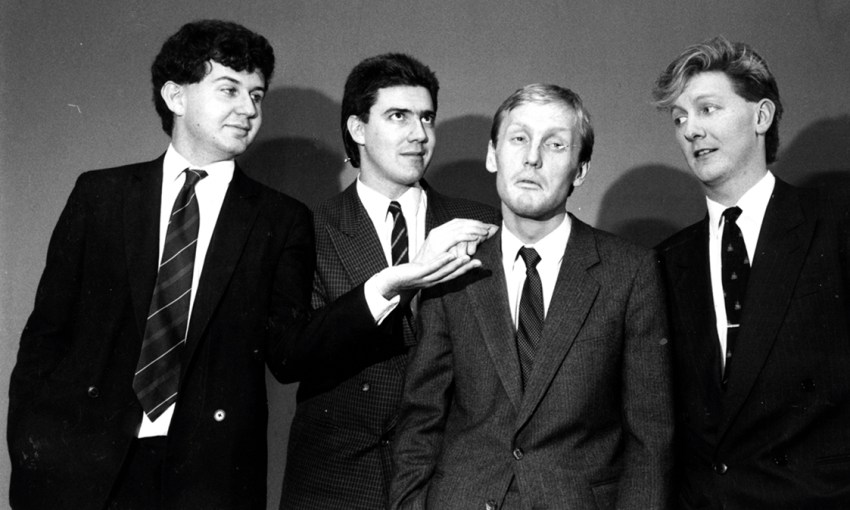
“I’m sure there was a sense of validation that prompted me to take to the stage initially, but the laughs were always more important to me than the applause and awards. Even though I was at university for four years I was doing Footlight shows for about eight years, just hanging around.”
The comedian’s Footlights alumni included now-lawyer and Law Council of Australia former president Alex Ward, Adelaide barrister Anthony Durkin and Federal Circuit Court judge Tim Heffernan.
Shaun’s current Mad As Hell co-star Francis Greenslade and co-creator Gary McCaffrie were also part of the Footlights era in the ’80s. It was Gary, who moved to Melbourne and began writing comedy for television, who inspired Shaun to make the leap from the law. He finally had a “now or never” moment when his wife Leandra, also a lawyer, put a date on the calendar – give it a go before then or give it up.
It was the impetus Shaun needed and in the mid-’90s he moved to Melbourne and began writing scripts for the comedy series Full Frontal. He also stepped in front of the camera, creating characters such as the brain-damaged boxer Milo Kerrigan and Italian male model Fabio.
That early success led to his own variety show Micallef Tonight in 2001, a short-lived and formative experience.
“I had never been a commercial proposition,” Shaun says. “I was always in an ensemble like Full Frontal and when I did my tonight show on Channel Nine it lasted 13 episodes and was then axed.
“I made all my horrendous blunders in the first 10 years. I look back at some of the stuff I’ve done and most of the awful stuff that I can’t watch is in the first half of the time I’ve spent doing it. I still make mistakes and that’s good. If I knew it was going to work I probably wouldn’t bother making it. I’d say, ‘it’s perfect in my head, that will do’.
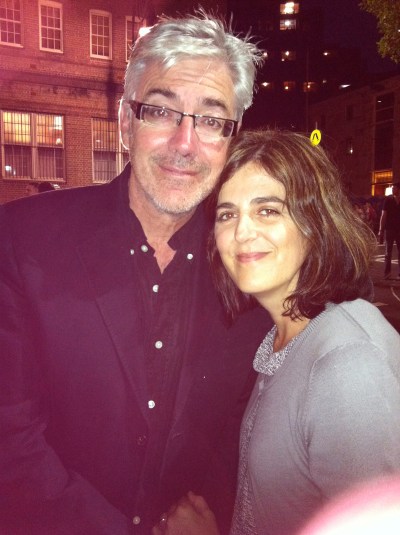
“It’s good actually talking about this last 10 years because everything that’s really embarrassing has been before that. We don’t have to dwell on that.”
The past decade has been good to the father of three, who has gradually cemented his place as one of the iconic comedians of the Australian television industry.
The big break came in 2010, just as his SBS series Newstopia was coming to an end. Shaun received a phone call from television executive Hilary Innes, offering him the hosting gig on Talkin’ ’Bout Your Generation.
“Hilary had produced the Logies when I hosted them back in 2001 and she thought I’d be good at hosting this new show they’d commissioned at Channel 10,” he says.
“So, in 2010 I was basking in the glory of not being box office poison.”
Talkin’ ’Bout Your Generation, which also starred Amanda Keller, Josh Thomas and Charlie Pickering, was a huge success, topped off with a Best Presenter gong for Shaun at the 2010 Logie Awards. He famously did not prepare an acceptance speech, instead reading out the acceptance speech Laurence Olivier gave at the Academy Awards.
“I was a bit embarrassed getting Best Presenter,” he says. “I mean Best Actor is a good one, maybe, but presenter they usually give to newsreaders and game show hosts. I guess that’s what I was, a game show presenter. But I was slightly embarrassed by that one.”
The show also won an Australian Film Industry Award that year for Outstanding Achievement in Television Screen Craft.
“I thought that’s more honest and an award for the workers,” he says. “The award wasn’t broadcast, it was just like when people win awards for the art department or lighting, so I felt happy with that one.”
While it’s easy for the self-deprecating comedian to downplay the accolades, they did, importantly, signify that his brand of off-beat, satirical comedy could work on mainstream commercial television.
Yet, one of the main reasons he took the Talkin’ ’Bout Your Generation gig was not as a career move, but to impress his then-young boys.
“They were in grade one, four and six and I did want to do something they would watch, and back then in 2010 families did still sit down and watch television,” Shaun says.
“So, it was perfect. I would go into the school ground and their friends watched it too, so there was some cred there and it did serve its purpose to do something family friendly. Newstopia had been a bit cerebral and a little cruel here and there, but this was just gentle and stupid and I was comfortable doing that.
“It worked well for everybody involved. It wasn’t only lucrative and helpful for my career but also good for Amanda, Charlie and Josh as well. We all still have fond memories about it.”
Today, two of Shaun’s sons are at university. Following in their parents’ footsteps. Joseph, 20, is studying law, while Gabriel, 19, is doing a film and television course at Swinburne University. Son Elias, 16, is still at school.
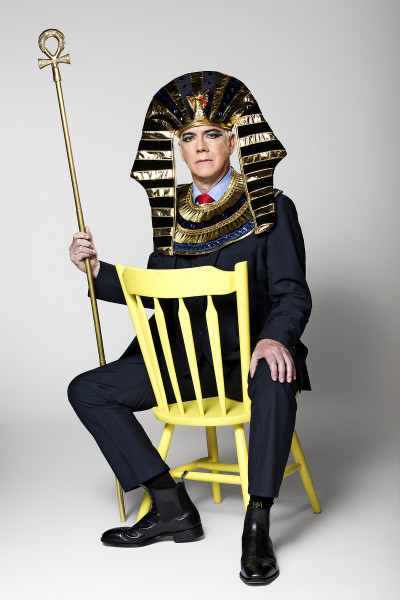
“Leandra and I both did law so Joe’s been very unimaginative with his choices, he’s just picked old stuff that we used to do,” Shaun says. Leandra now owns a handbag shop in Melbourne called Ziggurat.
“Gabriel is off doing what I would have really liked to do. If I had my life over again I would have gone into that sort of thing earlier and that’s the sort of course I would have tried to get into.
“Later in life, in the ’90s, I did apply for the Australian Film and Television School to take up some editing course, thinking that could get me into the business, and they didn’t accept me because it was a post-graduate course and I’d done nothing like that. My law degree counted for nothing in terms of getting into the editing course. Mind you, if I had done it I would be very skilled in analogue editing, which is completely useless now.”
The success of Takin’ ‘Bout Your Generation helped propel other projects for the performer. In 2012, he came up with the concept of satirical news show Mad as Hell after watching The Colbert Report, which he thought was “sheer brilliance”.
“So, I contacted the ABC and spoke to Mark Scott who was the general manager at the time,” he says. “That was quite helpful being a slightly warmer commercial property because people would actually answer the phone or ring you back.”
The ABC commissioned Mad As Hell, which went on to win a Logie in 2016 for Outstanding Comedy Program. It has now run for 10 seasons and will be back next year for two more.
“They’re even talking about 2021 so this is unchartered territory for me to have a show that’s lasted this long,” Shaun says.
Commercial success, particularly over the past 10 years, must be especially gratifying for the comedian, justifying his move from a successful law career.
When discussing his body of work over the past decade, Shaun apologises and says he may need to refer to his Wikipedia page to get the timings right, and it’s no wonder. He has been prolific creating comedy across radio, television, film, stage and books. Stage work included a show in 2010 at the Sydney Opera House with fellow comedian Stephen Curry, a version of Peter Cook and Dudley Moore’s production Good Evening, which they ended up touring.
“I wanted to get back on stage and do something,” Shaun says. “I suppose I try to keep myself honest as a comedian by making sure that I remember what a real audience is like to play in front of, rather than a studio audience, who are good but they’re a bit in on it and they‘re there to help you.”
There was also a movie with Stephen Curry called The Cup, where he played trainer Lee Freedman.
The comedian has also written numerous books in the past decade including A Selection of Smithereens, Ahead of the Game, The President’s Desk, Tales from a Tall Forest, The Uncollected Plays of Shaun Micallef and Mad as Hell and Back, which was co-written by Gary McCaffrie.
“It’s actually published by the same publishing house doing Malcolm Turnbull’s book so I asked the publisher, ‘wouldn’t it be great if we could put a quote on our cover from Turnbull?’,” Shaun says. “So, they did ask him, thinking he’d have a good sense of humour about it and think it was a good thing to do. Apparently, his response was, ‘yeah, nah’, which I would actually like to put on the cover.”
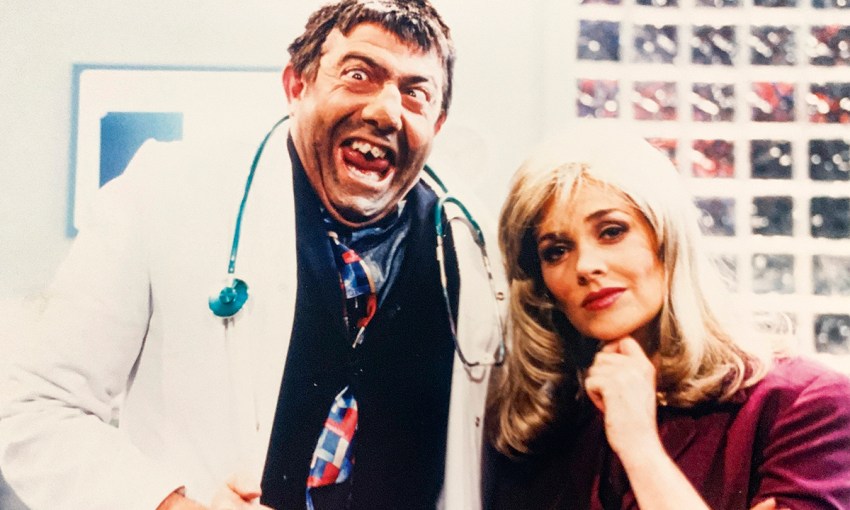
Shaun’s first novella back in 2010, called Preincarnate, was about a man who is murdered but goes back in time 300 years to inhabit someone else’s body.
So, does the comedian have a slight preoccupation with murder given he also wrote and starred in the 2013 series Mr and Mrs Murder with Kat Stewart?
“Funny you should mention that because my mother still reminds me that my grade three homeroom teacher in one of my report cards said ‘he has a morbid preoccupation with death’. This is in grade three, I find that astonishing. So, maybe it is a bit of a leitmotif through my life.”
A curiosity with life and death also crops up in Shaun’s more recent work, including his 2015 documentary series Stairway to Heaven. The first series was God, Gurus and the Ganges, which was followed up in 2017 with a three-part series, Mormons, Spiritual Healing and Armageddon.
“Given I was then 50-plus, I had been puzzling over the big questions and rather than just sort it out myself in my room, I thought I might do a documentary series where I talk to people who have unshakeable faith,” he says.
While he wasn’t exactly enlightened, Shaun says he did get a deeper understanding of why people need faith at certain times, particularly facing illness, death and ageing.
“As you get older you have an appreciation that the road ahead of you isn’t quite as long as the road behind you, that you’ve already traversed,” he says. “One of the things I really like doing, and it still happens when we walk down to the local pub for a meal and the boys come with us, they walk out ahead of us and I like seeing them walk ahead of us. In a metaphorical sense, you get an idea that when I’m gone they’ll still be on whatever road this is that doesn’t end and figuratively I could turn around to see my own parents dawdling behind me.
“I like that idea of continuity occurring in that way, rather than having to go up to some magic land in the sky.”
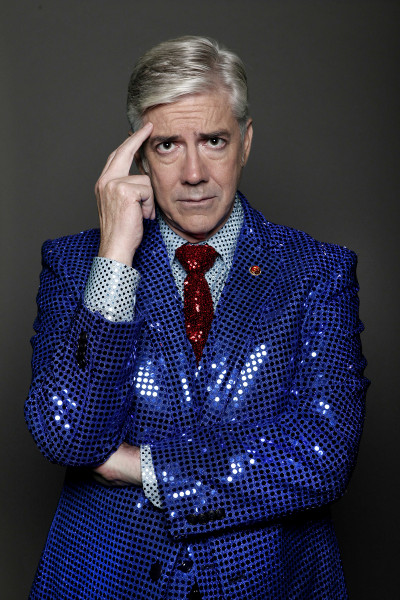
The comedian admits he was “territorial and suspicious” when it came to collaborating on ideas early in his comedy career. These days he is more relaxed and the hunger for success has given way to a more philosophical approach.
“I don’t think I’ll be doing it forever,” he says. “There are other more important things in the world than dancing on the periphery, which is kind of what TV is, but I’m jolly grateful for it. It’s my love and it gives me great pleasure, that’s something that hasn’t diminished. I’m almost as happy to watch something that’s funny as to participate in it. When people do it well it’s the most beautiful thing.
“I’ve been very lucky, it’s been a boulevard of rose blossoms. I’ve always considered it a bonus because I thought I’d be a lawyer for the rest of my life and I’m sure I would have been very happy, but I thought I‘d try something else. I thought ‘I’ve been doing this for 25 years, so I might do something else now’.
“I think it’s important to do something else because your power diminishes as a performer anyway. There’s nothing worse than an old clown, that’s just sad; ‘How ill white hairs become a fool and jester’, and all that. I’ve got to find out what the next thing is and that might be the fun of it rather than finding it. Maybe that is a hint as to what the whole purpose of our life is — to keep looking.”
Mentoring young comedians is something that brings him great joy these days, helping them navigate the industry.
“What floats my boat is to collaborate with younger and new people and I’m always aware that my time will be up shortly,” he says. “I’ve had a really good run but it’s probably time for someone else, given the limited resources of the ABC.”
Shaun is also currently working on a new ABC documentary, Shaun Micallef’s On The Sauce, focusing on Australians’ relationship with alcohol. The teetotaller hasn’t had a drink in 25 years, simply because “he wasn’t that good at it”. The new documentary will air mid-2020.
“I guess you try and fashion out some vague philosophy and by the time you are knocking on heaven’s door, you like to think you’ve worked out the purpose of your life,” he says.
“For me, it is to always try and see the good in people, in everybody, and find the good in situations. If you can’t find it, you’ve got to make it yourself and create it out of nothing if you have to. It’s a vague and amorphous goal, I know, but that’s my guiding light.”
This story first appeared in the Dec 2019/Jan 2020 issue of SALIFE magazine.



